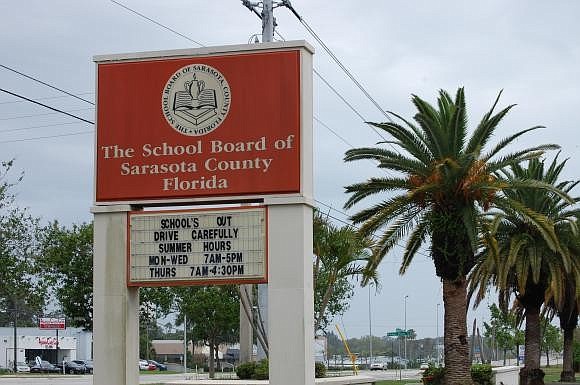- April 23, 2024
-
-
Loading

Loading

The Sarasota County School Board is projecting a balanced budget for the 2014-2015 school year — the district’s first projected surplus in seven years.
The School Board took its first step in planning the 2014-2015 budget at a Jan. 21 work session.
Deputy Chief Financial Officer Al Weidner presented the preliminary budget to School Board members calculating a budget surplus of $952,974 for the next school year — a sharp departure from a string of consecutive years of budget deficits, including a $10,518,565 revenue shortfall during the 2012-2013 school year, and a $6,472,547 deficit in 2013-2014.
"I haven’t seen that in so long, it's just hard to believe," said School Board member Frank Kovach, referring to the projected budget surplus. "It's the first time we've been presented with a balanced budget in years.”
Sarasota County lost 40% of its property tax base following the 2008 economic downturn, which left the district’s budget, which is primarily drawn from property taxes, with a severe revenue shortfall and necessitated a series of major budget cuts. The district subsequently endured consecutive years of budget deficits as it attempted to pare down spending to match revenue without affecting the quality of education in Sarasota County’s schools.
The preliminary 2014-2015 budget set spending at just more than $393 million, which represents a relatively conservative 1.3% increase over projected 2013-2014 spending.
"I'm glad you're conservative up front," School Board member Carolyn Brown said, referring to the small spending increase.
Anticipated revenues and income transfers for next school year, however, are expected to comfortably outpace the increase in spending. The projected $12,414,365 revenue increase in 2014-2015 represents a 3.2% jump over revenue projections in the current budget.
The projected revenue increase is based on a predicted 5% jump in tax revenue, largely due to increasing home values in the county. Taxes will not need to be raised to account for the increase in spending, according to preliminary estimates.
District tax revenue is drawn from property taxes; the amount is determined by a taxable percentage of a property's value, called a millage rate. According to the preliminary 2014-2015 budget, the current rate of 1.000 mills will not need to be increased.
So far in 2013-2014, greater-than-anticipated property tax revenue — a result of improving home values — has offset a state-funding shortfall, capping the year's revenue shortfall to only $40,286.
Yet, despite projections that 2013-2014 spending levels will come in about $2 million under what was originally forecast, the 2013-2014 budget still accrued a deficit of more than $6 million.
 The district created its preliminary 2014-2015 budget based on a series of assumptions, including: no changes to staff salaries, the continuation of a hiring freeze and a decrease in countywide enrollment by 80 students.
The district created its preliminary 2014-2015 budget based on a series of assumptions, including: no changes to staff salaries, the continuation of a hiring freeze and a decrease in countywide enrollment by 80 students.
The district's cost projections also include a 5% increase in gasoline and diesel prices, a 4% increase in property insurance and a 4% increase in textbook costs due to new state standards.
Weidner cautioned, however, that changes to state funding could quickly turn the projected budget surplus upside down.
"This is all based on the one big unknown, which is what the governor and legislature will do," Weidner said. "That could change this completely."
District Superintendent Lori White also offered a word of caution, adding that, despite the good news of a potentially balanced budget, the district should maintain its focus on finding efficiencies and identifying additional cost-saving measures to continue rolling back budget cuts required during the lean years of the economic downturn.
The School Board will continue to review and debate the proposed budget, setting priorities and goals, until the board first votes on a preliminary budget in April. The board will adopt the final 2014-2015 budget in September.